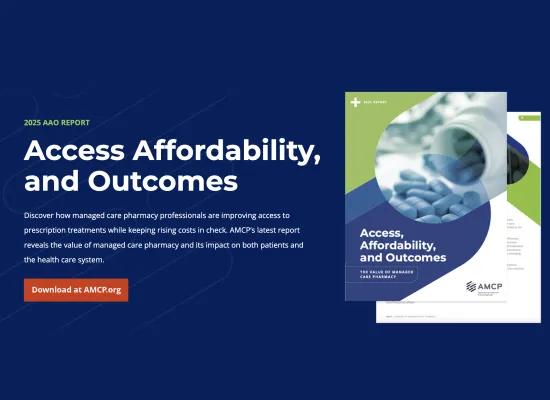
AMCP Partnership Forum Delivers Recommendations to Modernize Specialty Medication Benefits
Alexandria, Va., Dec. 17, 2019 — Increased simplicity, broader financial risk sharing, and an enhanced focus on patient care were among the recommendations developed by diverse stakeholders at a recent AMCP Partnership Forum focused on how to better manage the high costs of specialty medications.
Experts from across the health care spectrum gathered outside of Washington, D.C., from Dec. 10–11 to explore ways to modernize the specialty pharmacy benefit for the 21st Century.
While specialty medications, including biologics and innovative gene therapies, represent about 2 percent of all prescriptions written, they account for nearly 50 percent of all drug spending.
“We need a fresh approach to managing these products,” said AMCP CEO Susan A. Cantrell, RPh, CAE. “How do you plan for a million-dollar drug? How do you change systems to reduce administrative burdens and lower costs? How do you ensure patients will still have access to valuable innovation? These are some of the questions that health care payers must answer to remain good stewards of limited resources.”
To this end, the AMCP Partnership Forum evaluated strengths and weakness of current specialty medicine benefit designs and examined threats and opportunities for making improvements. Suggestions for new models and approaches included calls to:
- Simplify benefit designs and make them easier for everyone to understand. Complexity adds costs to health care systems, while greater simplicity allows patients to better understand their options and make shared decisions.
- Ensure benefits remain patient-centric and encompass patients’ social determinants, while focusing on overall health improvements rather than each specific health care intervention.
- Develop common longitudinal databases for patients to maintain medication records over time. This would allow different providers and health plans access to records that ensure continuity of care, while developing systems that facilitate payments to be spread over time.
- Reimagine and broaden existing reinsurance programs. This would allow health plans to spread financial risks of costly specialty treatments over larger population bases.
- Develop common definitions for success and failures of treatments. These definitions could be used to develop and execute value-based contracts, which may include manufacturer warranties on products that do not show improved outcomes.
- Create best practices, case studies and educational programs that allow providers and health plans to ensure the highest quality care is being delivered.
- Leverage lessons learned from insurance models for other expensive and lifesaving treatments and consider innovative coverage for specific treatments/technologies to ensure patient access and affordability.
All findings and recommendations from the AMCP Partnership Forum, “What’s Next for Specialty Medication Benefit Design and Reimbursement,” will be published in an upcoming issue of AMCP’s Journal of Managed Care & Specialty Pharmacy. The event was sponsored by Amgen, AstraZeneca, Bayer, GSK, Merck, Pfizer, PhRMA, Takeda, and Xcenda.
Featured News & Resources
See Full CalendarAward Applications Open
AMCP eLearning Day: Nexus Encore
AMCP 2026 Registration Opens
Upcoming Events
AMCP offers a wide variety of educational opportunities, from events and webinars to online training.







